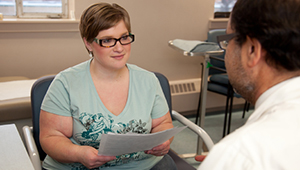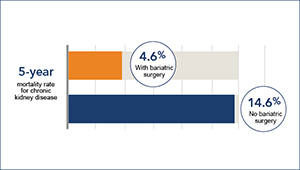Obesity
Research overview
“Obesity is the number-one health problem in the United States because it negatively affects our population’s health more than any other condition,” said Kaiser Permanente Washington Health Research Institute Senior Investigator David Arterburn, MD, MPH. Kaiser Permanente Washington researchers are doing practical research to learn how doctors, patients, families, employers, and policymakers can best work together to prevent and treat obesity.
“We’re focusing on three ways to halt the obesity epidemic,” said Senior Investigator Dori Rosenberg, PhD, MPH. “We’re helping to change obesity-promoting environments, bringing evidence-based prevention and treatment programs into health care systems, and helping people develop lifelong healthy diet and activity habits.”
Kaiser Permanente Washington obesity research areas include:
- reducing sedentary behavior and promoting physical activity and healthy diet in various age groups, populations with chronic conditions, and families;
- shared decision making to help patients find the best way to a healthy weight;
- implementing health coaches in primary care to support behavior changes;
- social networks that support lifestyle change programs;
- relationships between medications and genetic factors in developing obesity;
- health system, community, and national policies that address obesity;
- relationships between obesity and depression, diabetes, and other conditions; and
- long-term benefits and risks of bariatric (weight loss) surgery.
“Obesity is caused by many factors, so at Kaiser Permanente Washington, we’re working on many levels,” said Paula Lozano, MD, MPH, a senior investigator and Kaiser Permanente Washington’s assistant medical director for preventive care. “We’re improving health care to help people who are obese now. But since obesity is a societal problem, we’re also studying how to change our homes and workplaces and neighborhoods to create more healthy environments.”
Recent publications on Obesity
Arterburn DE, Maciejewski ML, Berkowitz TSZ, Smith VA, Mitchell JE, Liu CF, Adeyemo A, Bradley KA, Olsen MK Does Long-Term Post-Bariatric Weight Change Differ Across Antidepressants? 2022 Mar;3(1):e114. doi: 10.1097/AS9.0000000000000114. Epub 2022-01-10. PubMed
Howard R, Chao GF, Yang J, Thumma JR, Arterburn DE, Telem DA, Dimick JB Medication Use for Obesity-Related Comorbidities After Sleeve Gastrectomy or Gastric Bypass 2022 Mar;157(3):248-256. doi: 10.1001/jamasurg.2021.6898. Epub 2022-01-12. PubMed
Greenwood-Hickman MA, Walker R, Bellettiere J, LaCroix AZ, Kim B, Wing D, Richmire K, Crane PK, Larson EB, Rosenberg DE Associations Between Perceived Neighborhood Walkability and Device-Based Physical Activity and Sedentary Behavior Patterns in Older Adults 2022 Feb;30(1):98-106. doi: 10.1123/japa.2020-0387. Epub 2021-08-13. PubMed
Koffman L, Levis AW, Haneuse S, Johnson E, Bock S, McSperitt D, Gupta A, Arterburn D Evaluation of Intensive Telephonic Nutritional and Lifestyle Counseling to Enhance Outcomes of Bariatric Surgery 2022 Jan;32(1):133-141. doi: 10.1007/s11695-021-05749-4. Epub 2021-10-19. PubMed
Barthold D, Brouwer E, Barton LJ, Arterburn DE, Basu A, Courcoulas A, Crawford CL, Fedorka PN, Fischer H, Kim BB, Mun EC, Murali SB, Reynolds K, Yoon TK, Zane RE, Coleman KJ Minimum Threshold of Bariatric Surgical Weight Loss for Initial Diabetes Remission 2022 Jan;45(1):92-99. doi: 10.2337/dc21-0714. Epub 2021-09-13. PubMed
Researchers in Obesity
 David E. Arterburn, MD, MPHSenior Investigator |
 Allen Cheadle, PhDSenior Investigator, KPWHRI; Senior Research Associate, CCHE |
 Andrea J. Cook, PhDSenior Biostatistics Investigator |
 Maricela Cruz, PhDAssociate Biostatistics Investigator |
 Nicole M. Gatto, PhD, MPHPrincipal Collaborative Scientist |
 Beverly B. Green, MD, MPHSenior Investigator |
 Mikael Anne Greenwood-Hickman, MPHSenior Collaborative Scientist |
 Paula Lozano, MD, MPHSenior Investigator; Director, ACT Center |
 Dori E. Rosenberg, PhD, MPHSenior Investigator |
 Gregory E. Simon, MD, MPHSenior Investigator |











